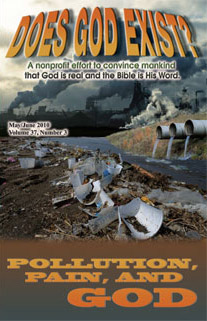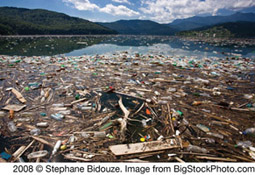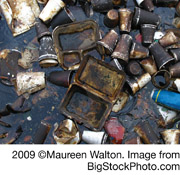
 As the father of a child born with multiple birth
defects, I have
struggled with the “Why me?” question as much as anyone who has been
through an experience like that. The whole issue of why there is
massive human pain in a world supposedly created by a kind, loving
heavenly Father, is one that atheists use effectively in casting doubt
on the existence of God. The usual Christian response to a discussion
of why a baby should be born with massive congenital problems is to
say, “This is just for a brief time in this life, and in heaven it
won’t be an issue.” That is true, but not very comforting. It is also
common for Christians to talk about what the baby brings to others as
they serve the infant. I still vividly remember a child in my son’s
class for the mentally impaired coming up to me when he heard I was
giving lectures on the existence of God. As he pointed to a playground
full of running, laughing children behind an elementary school he said
to me, “Why did God make me retarded so I can’t do what they can do?”
As the father of a child born with multiple birth
defects, I have
struggled with the “Why me?” question as much as anyone who has been
through an experience like that. The whole issue of why there is
massive human pain in a world supposedly created by a kind, loving
heavenly Father, is one that atheists use effectively in casting doubt
on the existence of God. The usual Christian response to a discussion
of why a baby should be born with massive congenital problems is to
say, “This is just for a brief time in this life, and in heaven it
won’t be an issue.” That is true, but not very comforting. It is also
common for Christians to talk about what the baby brings to others as
they serve the infant. I still vividly remember a child in my son’s
class for the mentally impaired coming up to me when he heard I was
giving lectures on the existence of God. As he pointed to a playground
full of running, laughing children behind an elementary school he said
to me, “Why did God make me retarded so I can’t do what they can do?”
There is no doubt that things like cancer, birth defects, muscular
dystrophy, cerebral palsy, and cystic fibrosis bring out good things in
those who care for the afflicted. I have written extensively about how
my son’s multiple-birth-defect problems have changed me. (The book is
entitled Timothy, My Son and My
Teacher.) There is also no doubt that
Christians have a better answer than atheists in this area, because
atheism only suggests death since “survival of the fittest” is their
guiding principle. Abortion and euthanasia are the only real options
atheism offers. Atheist spokesmen, like Peter Singer, have made this
clear, and on a physical level it makes sense.
Another point that has been margin ally treated in apologetic literature
is the long-term effect of pollution. There is a growing body of
evidence that a huge percentage of the problems that come to mankind is
the result of environmental irresponsibility on the part of people. We
know that a large percentage of cancer is caused by man-made
carcinogens in the environment. Even cancers that are not directly
caused by chemicals that man has put into the air and water, are
sometimes related to our own abuse of the environment. There is strong
evidence that skin cancer is related to the depletion of the ozone
layer, which seems to be connected to the fluorides that man has dumped
into our water and air. Food additives and substitutes can have severe
effects on human brains and digestive processes. The disposal of
herbicides and pesticides has had catastrophic effects on countless
numbers of people. Lead and mercury contamination has caused severe
birth defects in all cultures of the earth. In their attempts to
challenge global warming, many writers have ignored the unquestionable
effects of man’s waste being put into the environment.
ally treated in apologetic literature
is the long-term effect of pollution. There is a growing body of
evidence that a huge percentage of the problems that come to mankind is
the result of environmental irresponsibility on the part of people. We
know that a large percentage of cancer is caused by man-made
carcinogens in the environment. Even cancers that are not directly
caused by chemicals that man has put into the air and water, are
sometimes related to our own abuse of the environment. There is strong
evidence that skin cancer is related to the depletion of the ozone
layer, which seems to be connected to the fluorides that man has dumped
into our water and air. Food additives and substitutes can have severe
effects on human brains and digestive processes. The disposal of
herbicides and pesticides has had catastrophic effects on countless
numbers of people. Lead and mercury contamination has caused severe
birth defects in all cultures of the earth. In their attempts to
challenge global warming, many writers have ignored the unquestionable
effects of man’s waste being put into the environment.
We are now learning that medical wastes have been disposed of in our
air, rivers, lakes, and oceans, putting hormones and complex organic
materials not found in nature into our food chain. In our March/April
2010 “News and Notes” we reported on how chemicals released into the
air by plastic manufacturing seem to be having an effect on sexual
orientation. This means that even the homosexual/heterosexual issue may
be connected to what people have done with the chemicals we produce.
 When God created the earth, man and his animals, God
repeatedly said,
“It is good.” (See Genesis
1:4,
10,
12,
18,
21, 25.) At the end of the
creation process in verse
31 we are told that it was “very good.” When
sin entered the picture and man began to do things that were in
opposition to what God told man to do, consequences began to appear.
Man’s disobedience began to generate strife leading to the first
murder. It also produced negative changes in the earth’s environment.
Genesis 3:17 – 20
tells us that the ground was cursed because of man
and that getting food from the ground would no longer be a matter of
gathering, but that labor would be required. From the beginning, man
had been told that he was to take care of the world where God placed
him (Genesis 2:15).
Instead of doing that, mankind has used the earth
as a dumping ground for our own selfish use.
When God created the earth, man and his animals, God
repeatedly said,
“It is good.” (See Genesis
1:4,
10,
12,
18,
21, 25.) At the end of the
creation process in verse
31 we are told that it was “very good.” When
sin entered the picture and man began to do things that were in
opposition to what God told man to do, consequences began to appear.
Man’s disobedience began to generate strife leading to the first
murder. It also produced negative changes in the earth’s environment.
Genesis 3:17 – 20
tells us that the ground was cursed because of man
and that getting food from the ground would no longer be a matter of
gathering, but that labor would be required. From the beginning, man
had been told that he was to take care of the world where God placed
him (Genesis 2:15).
Instead of doing that, mankind has used the earth
as a dumping ground for our own selfish use.
It is not our intent here to suggest that science is evil, or that
research into things that can improve our life should not be done. The
problem is in the greed factor that has caused irresponsible actions by
those producing these things commercially. God has given us the tools
to do wonderful things, and He has also given us the tools to clean up
after ourselves. Our failure to do this has caused massive pain for
countless human beings.
The atheist is very likely to say “Why doesn’t God just stop what is
happening if He is so loving and kind-hearted?” This is the same
challenge as those who were victimized by the horrible things done to
the Jewish population by Hitler in World War II. Why did God just not
stop the horrible abuses that killed thousands of innocent people in
the prison camps of Germany?
From the very beginning of God’s communication with man, God has always
told us that we will reap the consequences of what we sow. In
Deuteronomy 28 God
makes this point clear. He begins by telling His
people what would happen if they “fully obey the Lord your God and
carefully follow all his commands” (verse 1). For fourteen
verses God
tells all the good things that will come from doing everything right.
Those commands involved things like giving the land rest (Leviticus
25:5), being careful about wastes,and paying careful attention to
diet.
It included valid medical practices like quarantine and wa shing. God
then tells in Deuteronomy
28:15
– 29:1 all the awful things that will
happen if people live selfishly and fail to follow God’s commands. Some
of the consequences are political and social, but many of them involve
health and agriculture. This same principle is given in Galatians
6:1 – 10. The positive consequences from doing things God’s way are
given followed by the warning, “Be not deceived; God is not mocked: for
whatsoever a man soweth, that shall he also reap” (Galatians 6:7). That
promise is true individually, but it is also true for humankind as a
whole.
shing. God
then tells in Deuteronomy
28:15
– 29:1 all the awful things that will
happen if people live selfishly and fail to follow God’s commands. Some
of the consequences are political and social, but many of them involve
health and agriculture. This same principle is given in Galatians
6:1 – 10. The positive consequences from doing things God’s way are
given followed by the warning, “Be not deceived; God is not mocked: for
whatsoever a man soweth, that shall he also reap” (Galatians 6:7). That
promise is true individually, but it is also true for humankind as a
whole.
Can we rationally believe that God should run around reversing all of
the destructive things we do? Should God clean up our air as we pump
chemicals into it and release man-made hormones that will upset our
minds and overwhelm our social institutions? Should God remove the
asbestos, lead, and mercury we dump into our lakes, rivers, and oceans
so that a few individuals can make more money by not cleaning up the
waste their businesses produce? We need to be angry, but not with God.
God did it right, and we messed it up. The green revolution is a good
thing, assuming we revert to the positive use of what God has given us
and that we do not make different toxins that clean up one mess while
creating another. We have the tools to do it right. We need to be
indignant and angry with the situation, but let our anger go towards
the selfish industrial and medical money-makers who have brought
incredible pain and suffering to people all over this planet. We must
not misdirect our anger toward the God who loves us, cares for us, and
weeps with us at the horrible consequences of sin.
Back to Contents
Does God Exist?, MayJun10.


 As the father of a child born with multiple birth
defects, I have
struggled with the “Why me?” question as much as anyone who has been
through an experience like that. The whole issue of why there is
massive human pain in a world supposedly created by a kind, loving
heavenly Father, is one that atheists use effectively in casting doubt
on the existence of God. The usual Christian response to a discussion
of why a baby should be born with massive congenital problems is to
say, “This is just for a brief time in this life, and in heaven it
won’t be an issue.” That is true, but not very comforting. It is also
common for Christians to talk about what the baby brings to others as
they serve the infant. I still vividly remember a child in my son’s
class for the mentally impaired coming up to me when he heard I was
giving lectures on the existence of God. As he pointed to a playground
full of running, laughing children behind an elementary school he said
to me, “Why did God make me retarded so I can’t do what they can do?”
As the father of a child born with multiple birth
defects, I have
struggled with the “Why me?” question as much as anyone who has been
through an experience like that. The whole issue of why there is
massive human pain in a world supposedly created by a kind, loving
heavenly Father, is one that atheists use effectively in casting doubt
on the existence of God. The usual Christian response to a discussion
of why a baby should be born with massive congenital problems is to
say, “This is just for a brief time in this life, and in heaven it
won’t be an issue.” That is true, but not very comforting. It is also
common for Christians to talk about what the baby brings to others as
they serve the infant. I still vividly remember a child in my son’s
class for the mentally impaired coming up to me when he heard I was
giving lectures on the existence of God. As he pointed to a playground
full of running, laughing children behind an elementary school he said
to me, “Why did God make me retarded so I can’t do what they can do?” ally treated in apologetic literature
is the long-term effect of pollution. There is a growing body of
evidence that a huge percentage of the problems that come to mankind is
the result of environmental irresponsibility on the part of people. We
know that a large percentage of cancer is caused by man-made
carcinogens in the environment. Even cancers that are not directly
caused by chemicals that man has put into the air and water, are
sometimes related to our own abuse of the environment. There is strong
evidence that skin cancer is related to the depletion of the ozone
layer, which seems to be connected to the fluorides that man has dumped
into our water and air. Food additives and substitutes can have severe
effects on human brains and digestive processes. The disposal of
herbicides and pesticides has had catastrophic effects on countless
numbers of people. Lead and mercury contamination has caused severe
birth defects in all cultures of the earth. In their attempts to
challenge global warming, many writers have ignored the unquestionable
effects of man’s waste being put into the environment.
ally treated in apologetic literature
is the long-term effect of pollution. There is a growing body of
evidence that a huge percentage of the problems that come to mankind is
the result of environmental irresponsibility on the part of people. We
know that a large percentage of cancer is caused by man-made
carcinogens in the environment. Even cancers that are not directly
caused by chemicals that man has put into the air and water, are
sometimes related to our own abuse of the environment. There is strong
evidence that skin cancer is related to the depletion of the ozone
layer, which seems to be connected to the fluorides that man has dumped
into our water and air. Food additives and substitutes can have severe
effects on human brains and digestive processes. The disposal of
herbicides and pesticides has had catastrophic effects on countless
numbers of people. Lead and mercury contamination has caused severe
birth defects in all cultures of the earth. In their attempts to
challenge global warming, many writers have ignored the unquestionable
effects of man’s waste being put into the environment.  When God created the earth, man and his animals, God
repeatedly said,
“It is good.” (See Genesis
1:4,
10,
12,
18,
21, 25.) At the end of the
creation process in verse
31 we are told that it was “very good.” When
sin entered the picture and man began to do things that were in
opposition to what God told man to do, consequences began to appear.
Man’s disobedience began to generate strife leading to the first
murder. It also produced negative changes in the earth’s environment.
Genesis 3:17 – 20
tells us that the ground was cursed because of man
and that getting food from the ground would no longer be a matter of
gathering, but that labor would be required. From the beginning, man
had been told that he was to take care of the world where God placed
him (Genesis 2:15).
Instead of doing that, mankind has used the earth
as a dumping ground for our own selfish use.
When God created the earth, man and his animals, God
repeatedly said,
“It is good.” (See Genesis
1:4,
10,
12,
18,
21, 25.) At the end of the
creation process in verse
31 we are told that it was “very good.” When
sin entered the picture and man began to do things that were in
opposition to what God told man to do, consequences began to appear.
Man’s disobedience began to generate strife leading to the first
murder. It also produced negative changes in the earth’s environment.
Genesis 3:17 – 20
tells us that the ground was cursed because of man
and that getting food from the ground would no longer be a matter of
gathering, but that labor would be required. From the beginning, man
had been told that he was to take care of the world where God placed
him (Genesis 2:15).
Instead of doing that, mankind has used the earth
as a dumping ground for our own selfish use. shing. God
then tells in Deuteronomy
28:15
– 29:1 all the awful things that will
happen if people live selfishly and fail to follow God’s commands. Some
of the consequences are political and social, but many of them involve
health and agriculture. This same principle is given in Galatians
6:1 – 10. The positive consequences from doing things God’s way are
given followed by the warning, “Be not deceived; God is not mocked: for
whatsoever a man soweth, that shall he also reap” (Galatians 6:7). That
promise is true individually, but it is also true for humankind as a
whole.
shing. God
then tells in Deuteronomy
28:15
– 29:1 all the awful things that will
happen if people live selfishly and fail to follow God’s commands. Some
of the consequences are political and social, but many of them involve
health and agriculture. This same principle is given in Galatians
6:1 – 10. The positive consequences from doing things God’s way are
given followed by the warning, “Be not deceived; God is not mocked: for
whatsoever a man soweth, that shall he also reap” (Galatians 6:7). That
promise is true individually, but it is also true for humankind as a
whole.